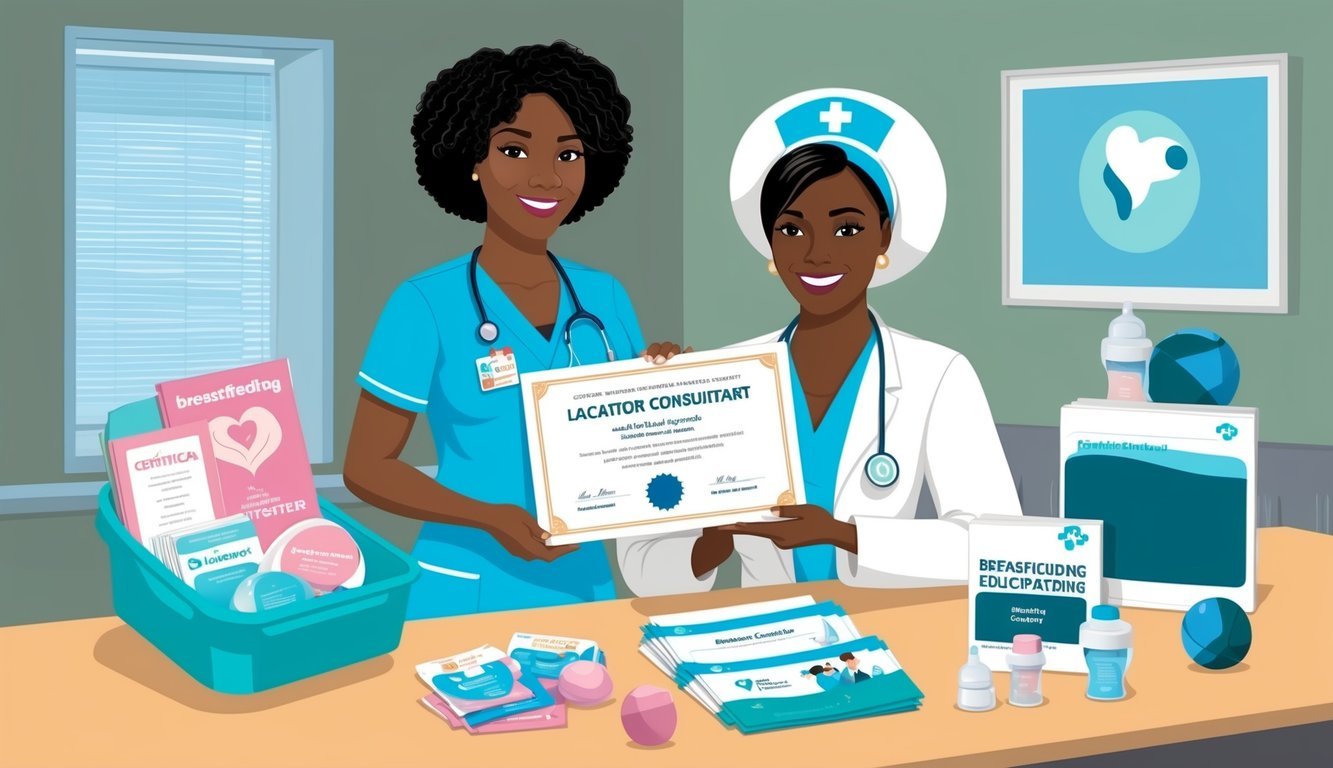Lactation certification for nurses is a valuable step in supporting mothers and enhancing your professional skills.
Becoming certified allows you to provide expert guidance on breastfeeding, improving outcomes for both mothers and infants.
This certification not only boosts your credentials but also opens doors to new opportunities in maternal and child health.

As a registered nurse, you have unique insights and experiences that make you well-suited for this role.
Pursuing lactation certification involves education and training tailored to breastfeeding support.
You will learn about the latest practices in lactation management, which are essential for guiding families through their breastfeeding journeys.
Investing in lactation certification is not just about professional growth; it’s about making a difference in the community.
Nurses with this certification are in demand and can significantly impact maternal and infant health.
Key Takeaways
- Gaining lactation certification enhances your nursing skills.
- There are multiple paths to achieve lactation certification.
- Certified lactation consultants improve breastfeeding success rates.
Understanding Lactation Certification

Lactation certification is crucial for healthcare professionals who support breastfeeding families.
You’ll find various certifications that highlight different expertise levels in lactation support.
Understanding these can help you in your nursing career and improve the care you provide.
The Role of a Lactation Consultant
As a lactation consultant, your primary responsibility is to assist mothers with breastfeeding.
This support can include helping with latch issues, feeding techniques, and addressing concerns about supply.
Lactation consultants offer practical advice and emotional support to families.
In many cases, a lactation consultant can identify common problems and provide evidence-based solutions.
They can work in various settings, including hospitals, clinics, and community health programs.
By becoming certified, you can enhance your credibility and effectiveness in this role.
You can pursue certifications such as the Certified Lactation Counselor (CLC) or the International Board Certified Lactation Consultant (IBCLC).
Each path offers different focuses, training, and specializations.
Types of Lactation Certifications
There are several types of lactation certifications that you can pursue.
Here are a few key ones:
| Certification | Description |
|---|---|
| Certified Lactation Counselor (CLC) | Focuses on providing basic breastfeeding support. Certified after completing specific education and passing an exam. |
| International Board Certified Lactation Consultant (IBCLC) | Advanced certification requiring extensive education, clinical practice, and successful completion of a comprehensive exam. This is ideal for registered nurses (RNs) looking to specialize. |
| Advanced Nurse Lactation Consultant (ANLC) | Tailored for RNs, providing advanced training in lactation management. This may involve specific coursework and clinical hours. |
Choosing the right certification depends on your professional goals and the type of support you wish to provide.
Pursuing these certifications demonstrates your commitment to improving breastfeeding practices and your expertise in the field.
For guidance and resources, you may refer to organizations such as the Lactation Education Consultants or the International Board of Lactation Consultant Examiners.
Paths to Lactation Certification

Exploring your options for lactation certification can help you decide the best route for your career as a nurse.
Various certifications cater to different educational backgrounds and career goals in lactation support.
Certified Lactation Counselor (CLC) Certification
The Certified Lactation Counselor (CLC) certification is designed for those who want to provide basic breastfeeding support.
To earn this certification, you need to complete a 45-hour lactation-specific education program.
These programs often include both online and in-person training.
After completing the education requirements, you must pass the CLC exam.
This test is focused on breastfeeding management, counseling skills, and understanding common breastfeeding challenges.
The CLC certification is an excellent starting point for nurses seeking to help families with breastfeeding.
International Board Certified Lactation Consultant (IBCLC) Certification
The International Board Certified Lactation Consultant (IBCLC) certification is more advanced and recognized internationally.
To qualify, you need 90 hours of lactation-specific education, and a significant amount of clinical experience working with breastfeeding families.
You may choose from different pathways to meet the requirements.
The Aggregate Pathway is suitable for nurses with a health science background, while the Alternate Pathway can help others without a health degree.
After meeting all criteria, you will take the IBCLC exam, which tests your knowledge and skills in providing comprehensive lactation care.
Additional Lactation Credentials
In addition to CLC and IBCLC certifications, other credentials can enhance your expertise.
These include certifications like the Lactation Education Consultant (LEC) or the Certified Breastfeeding Specialist (CBS).
These programs and certifications focus on specialized areas of lactation and can further your knowledge and skills.
Many of these programs may require additional lactation-specific education or clinical hours but are valuable in today’s healthcare landscape.
Carefully consider your interests and career goals when selecting the right pathway in lactation certification.
Lactation Education and Training

Lactation education is crucial for nurses who wish to support breastfeeding mothers effectively.
Training programs are designed to provide necessary skills and knowledge.
This section covers the relevant training courses and ongoing education required for lactation professionals.
Lactation Counselor Training Course
The Certified Lactation Counselor (CLC) training course is essential for those looking to specialize in lactation management.
This course generally consists of 95 hours of lactation-specific education.
Participants will learn about breastfeeding techniques, common challenges, and strategies to support mothers.
A key feature of this course is the emphasis on practical skills and knowledge covered by the Academy of Lactation Policy and Practice.
Upon completion, you can become a CLC, which demonstrates your competence in lactation counseling.
You can find appropriate training options from resources such as Lactation Education Consultants and Lactation Training.
Continuing Education for Lactation Professionals
Continuing education is vital for maintaining your certification and staying updated in the field.
Ongoing training equips you with the latest research and practices in lactation management.
You are required to complete a specific number of continuing education units (CEUs) to renew your certification.
Many programs offer these CEUs through online courses, workshops, and seminars.
Joining organizations like the Academy of Lactation Policy and Practice can provide access to valuable resources.
You can also network with other professionals for sharing insights and best practices.
These continuing education opportunities ensure that you remain effective in your role and provide the best support to breastfeeding mothers.
Clinical Practice and Competency

Effective lactation certification for nurses involves specific requirements for clinical practice and competency.
This ensures that you are well-prepared to provide high-quality lactation care and support to breastfeeding families.
Clinical Hours and Experience
To become certified, you need to complete a minimum of 1,000 hours of lactation-specific clinical practice.
This practice must occur within an appropriate supervised setting, such as:
- Hospitals
- Birth centers
- Community clinics
- Lactation care clinics/practices
These clinical hours provide hands-on experience in breastfeeding management.
You will develop essential assessment skills and clinical counseling techniques.
Gaining diverse experiences in different settings will enhance your ability to address various lactation challenges effectively.
Competency Verification and Examination
Before you can take the certification examination, you must undergo competency verification.
This includes demonstrating your knowledge and skills in clinical situations.
The verification process often involves:
- Observations from experienced lactation professionals
- Simulations or practical assessments
You will also need to successfully pass a certification examination, such as the one offered for Certified Lactation Counselors or Advanced Nurse Lactation Consultants.
This ensures that you meet the necessary standards for providing effective lactation care.
Additional information can be found through the Academy of Lactation Policy and Practice to guide you through this process.
Career Opportunities and Professional Development
Lactation certification opens various pathways for nurses, helping to address the needs of mothers and infants.
As you pursue this certification, you will find diverse employment settings and opportunities for ongoing education and advancement.
Employment Settings for Lactation Consultants
Lactation consultants can work in multiple environments, providing vital support to new families.
Common settings include:
- Maternity Units: Assist mothers during their hospital stay to establish breastfeeding routines.
- Neonatal Intensive Care Units (NICUs): Offer specialized support for premature or ill infants.
- Outpatient Lactation Clinics: Provide follow-up care and education to breastfeeding mothers.
- Maternal and Child Health Services: Focus on improving overall health and wellness for families.
- Public Health and WIC Programs: Educate and assist low-income families on breastfeeding benefits.
- Parenting Centers and Military Family Support Centers: Offer community-based support and resources.
Each of these roles allows you to work collaboratively with the healthcare team, including physicians and midwives, to improve maternal and infant health outcomes.
Continuing Professional Education and Advancement
Ongoing education is crucial to maintain your certification and grow your skills.
There are several ways to enhance your knowledge:
- Online Courses: Institutions like Walden University and the Academy of Lactation Programs offer valuable resources for advanced lactation education.
- Baby-Friendly Hospital Initiative: Participating in this program can enhance your skills in promoting breastfeeding best practices.
- Virtual Office Hours: Many resources, including peer support and expert guidance, are available online to help you stay updated on ethics and new research.
Additionally, preparing for the certification through the International Board of Lactation Consultant Examiners can significantly impact your career prospects.
Each of these avenues helps you develop professionally while ensuring that you provide the best support to families.
Frequently Asked Questions

When considering lactation certification as a nurse, there are several important factors to understand.
This section provides clear answers about the requirements, costs, duration, salary expectations, job opportunities, and the difference between certifications.
What are the requirements to become a certified lactation consultant for nurses?
To become a Certified Lactation Consultant (IBCLC), you need to complete specific lactation education and clinical hours.
As a nurse, you can meet clinical hours through your work experience.
Additional coursework may be required to cover lactation-specific topics.
For more details, you can check this resource.
What is the typical cost associated with obtaining lactation certification for nurses?
The costs can vary widely depending on the programs you choose.
You might pay for courses, exam fees, and study materials.
On average, expect to spend several hundred to over a thousand dollars.
It’s important to budget for these expenses as you pursue certification.
How long does the certification process for a Lactation Consultant typically take?
The time required to obtain certification can differ based on your background and how much time you can dedicate.
Generally, it may take several months to a few years to complete the necessary education and clinical hours before applying for the exam.
What is the average salary for a Registered Nurse Lactation Consultant?
Registered Nurse Lactation Consultants can earn a competitive salary.
The average salary typically ranges from $60,000 to $80,000 per year.
However, this can vary based on experience, location, and workplace settings.
What job opportunities are available for Nurse Lactation Consultants?
As a Nurse Lactation Consultant, you can work in various settings, including hospitals, clinics, and private practices.
Opportunities extend to educational roles, where you may provide breastfeeding support and training for new parents or healthcare staff.
What is the difference between a Certified Lactation Counselor (CLC) and an International Board Certified Lactation Consultant (IBCLC)?
The main difference lies in the level of training and certification.
A CLC holds a certification focused on counseling and support for breastfeeding.
In contrast, an IBCLC has advanced training and is qualified to manage more complex lactation issues.
Each role plays a crucial part in supporting breastfeeding success.
